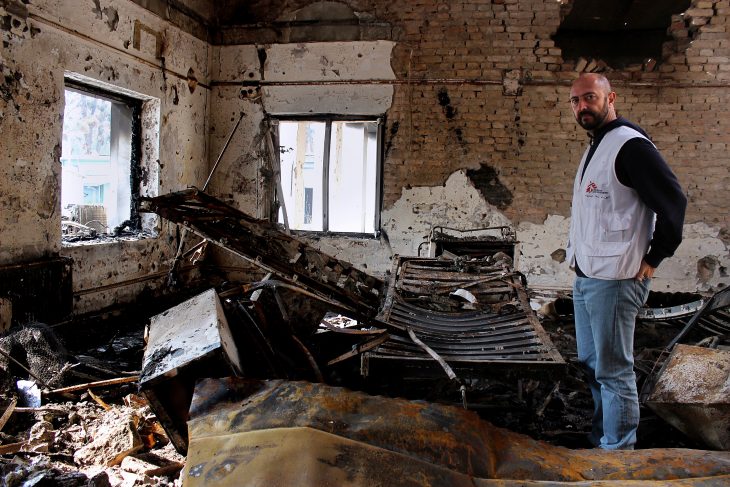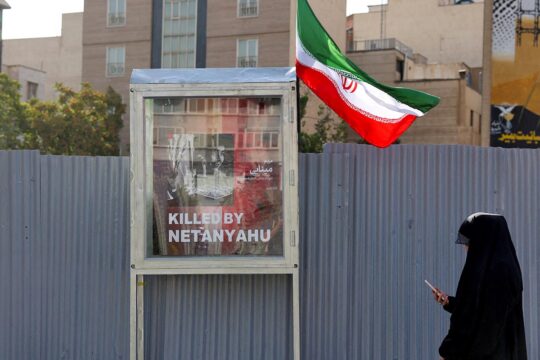Here we publish an interview with Helen Durham, International Law and Policy Director at the International Committee of the Red Cross (ICRC), a Swiss-based humanitarian organization which serves as the guardian of the Geneva Conventions. These Conventions form the heart of International Humanitarian Law (IHL) which is supposed to protect non-combatants in time of war. Yet not only are civilians being increasingly targeted, medical facilities have also come under attack in places such as Syria, Yemen and Afghanistan (Kunduz). The UN Security Council this week demanded that hospitals and clinics be protected in war zones, in a resolution that draws attention to the rise in attacks on medical workers in conflicts worldwide. Amid growing outrage over the deadly bombing of a camp for displaced Syrians, the UN also said this was likely a war crime. So are the "rules of war" in crisis?
JusticeInfo: Given the current humanitarian situations around the world today, do you think the so-called rules of war are in crisis?
Helen Durham: I think the rules themselves and all the framework that has been hard fought for over hundreds of years are not themselves in crisis. I think the issue is that the laws of war are increasingly under pressure for a range of reasons. One of them is the increasing complexity of conflict, the proliferation of non-State armed groups, issues such as migration and a whole range of factors that relate to how complex conflict is. But the second issue is whether States and non-State armed groups have the political will to follow the laws of war. So I think it’s misleading to say the legal framework itself is the problem. I think our energies need to be focused on whether there’s a political will to follow it.
JusticeInfo: The UN is organizing the first World Humanitarian Summit in Istanbul later this month, and its agenda includes respecting the rules of war. What do you expect to come out of this summit?
HD: There’s an opportunity with the World Humanitarian Summit because it’s a multi-stakeholder environment encompassing the whole humanitarian community, not just States, to drive home some key messages. So we’re hoping that it’s an opportunity to restate and redefine key humanitarian issues such as the vital importance of protection and the specific needs of populations in conflict areas and how there’s a need for diverse humanitarian ecosystems to respond. I’ll be going to Istanbul myself and appearing on a couple of panels dealing with gender and the rules of war, explosive weapons in populated areas and the issue of nuclear weapons. But we sincerely hope the summit will be a place where it’s more than just talk, and where commitments are reaffirmed.
JusticeInfo: In terms of commitments, what would you like to see?
HD: We made a whole raft of commitments last December in an international conference of the Red Cross and Red Crescent Movement. The commitments that were made and that we would like to see reflected at the World Humanitarian Summit are issues such as the need to ensure the protection of medical personnel during times of conflict, making sure that issues of sexual and gender-based violence are addressed, and working to strengthen the mechanism for compliance or respect for existing law.
JusticeInfo: I understand that at that December conference States refused to sign up to an ICRC and Swiss government proposal for a new mechanism to monitor the rules of war.
HD: Basically we went into the conference saying, with Switzerland, that we would like agreement on two elements: firstly an annual meeting where States could discuss issues of relevance on implementing International Humanitarian Law (IHL); and secondly the idea of reporting mechanisms, because the Geneva Conventions are among the few international treaties that don’t have a reporting requirement. Now a number of States felt this was not the right time, they weren’t ready for it, that there might be existing mechanisms within the legal framework that they could use rather than create a new one. So in the end what the conference Resolution talks about is a need to move forward, to continue to work on this and that the International Red Cross and the Swiss government need to report back on the progress at the next international conference, which is in 2019.
JusticeInfo: So if States were not ready to do anything concrete in December, why expect anything concrete to come out of the World Humanitarian Summit?
HD: There’s a lot of difference between the international conference and the World Humanitarian Summit. At the international conference there were only States and the Red Cross and Red Crescent Movement, whereas the World Humanitarian Summit has a whole range of other actors, a lot of civil society and other groups. Obviously we have to wait and see what the World Humanitarian Summit concretely delivers. But we are hoping that it at least reaffirms the commitments that have already been made. It is vital that the gathering comes out with a strong reminder to States to live up to the obligations they have already agreed to and that any new proposals that may come from the WHS can really assist in limiting suffering during times of armed conflict.







